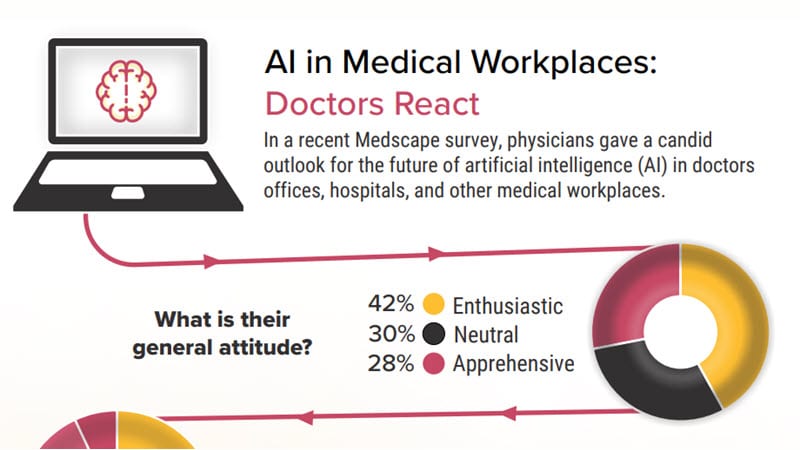Core Concepts
Doctors have varying opinions on AI's role in healthcare.
Abstract
The content discusses the contrasting views among doctors regarding the integration of artificial intelligence (AI) in medical practice. Some doctors embrace the idea of AI playing a significant role, while others express fear and skepticism. The article delves into the concerns surrounding AI's involvement in diagnosis and treatment, its potential impact on time spent with patients, and the necessity of government or medical society oversight.
Key Highlights:
Differing opinions among doctors on AI's role in medical practice.
Concerns regarding AI's primary or support role in diagnosis and treatment.
Debate on whether AI will enhance or hinder time spent with patients.
Discussions on the need for oversight by government or medical societies.
Infographic: Doctors Describe a Future With AI
Stats
"This infographic presents key findings related to US doctors' attitudes about using AI in medical workplaces."
"Check out the Medscape Physicians and AI Report 2023 for more details."
Quotes
"Some doctors covet a future with artificial intelligence (AI) front and center in their offices. Other physicians are terrified."
"Their opinions also diverge on whether a primary or support role for AI in diagnosis or treatment is concerning, whether the technology will really free up more time to spend with patients, and whether oversight by the government or medical societies is warranted."
Key Insights Distilled From
by Jon Mckenna at www.medscape.com 11-09-2023
https://www.medscape.com/viewarticle/997973
Deeper Inquiries
How can the medical field address the concerns of doctors who are apprehensive about AI integration?
Doctors who are apprehensive about AI integration in the medical field can be reassured through education and training programs. Providing comprehensive information about how AI works, its limitations, and the benefits it can bring to patient care can help alleviate fears. Additionally, involving doctors in the development and implementation of AI systems can give them a sense of control and ownership over the technology. Open communication channels for feedback and addressing concerns promptly can also build trust and acceptance among skeptical doctors.
What are the potential implications of AI taking on a primary role in diagnosis and treatment?
If AI were to take on a primary role in diagnosis and treatment, there are several potential implications to consider. On the positive side, AI's ability to process vast amounts of data quickly and accurately could lead to more efficient and accurate diagnoses, potentially reducing errors and improving patient outcomes. However, there are concerns about the overreliance on AI, which could lead to dehumanization of healthcare and the loss of the human touch in patient care. There are also ethical considerations regarding the accountability and transparency of AI algorithms in decision-making processes.
How can the government and medical societies ensure responsible AI implementation in healthcare?
To ensure responsible AI implementation in healthcare, the government and medical societies can establish clear guidelines and regulations for the development and use of AI systems. This includes setting standards for data privacy and security, ensuring transparency in AI algorithms, and promoting accountability for decisions made by AI systems. Collaboration between policymakers, healthcare providers, AI developers, and ethicists is essential to address the complex ethical and legal issues surrounding AI in healthcare. Regular audits and oversight mechanisms can also help monitor the use of AI and ensure that it aligns with ethical standards and patient safety.
0
More on Healthcare
